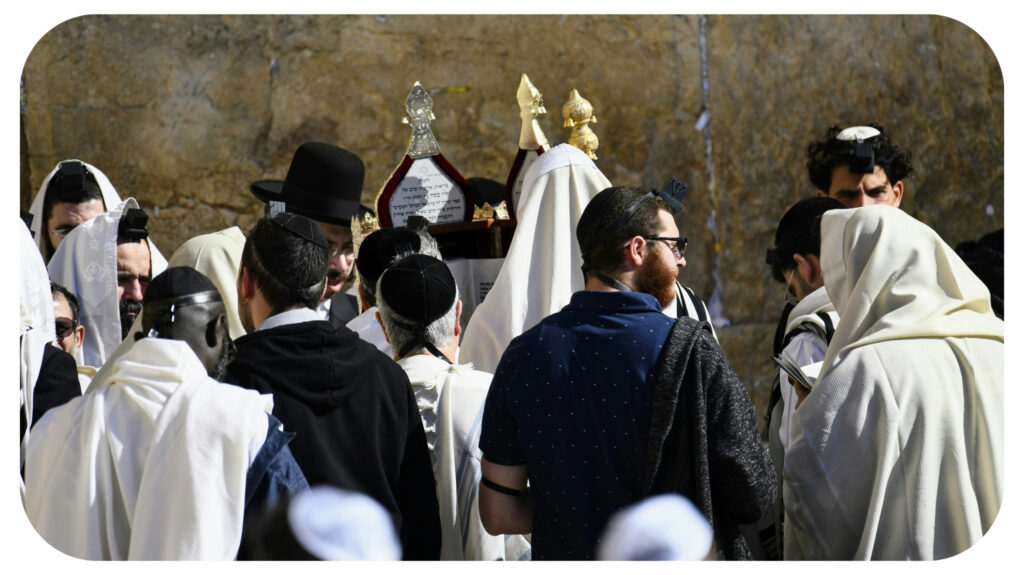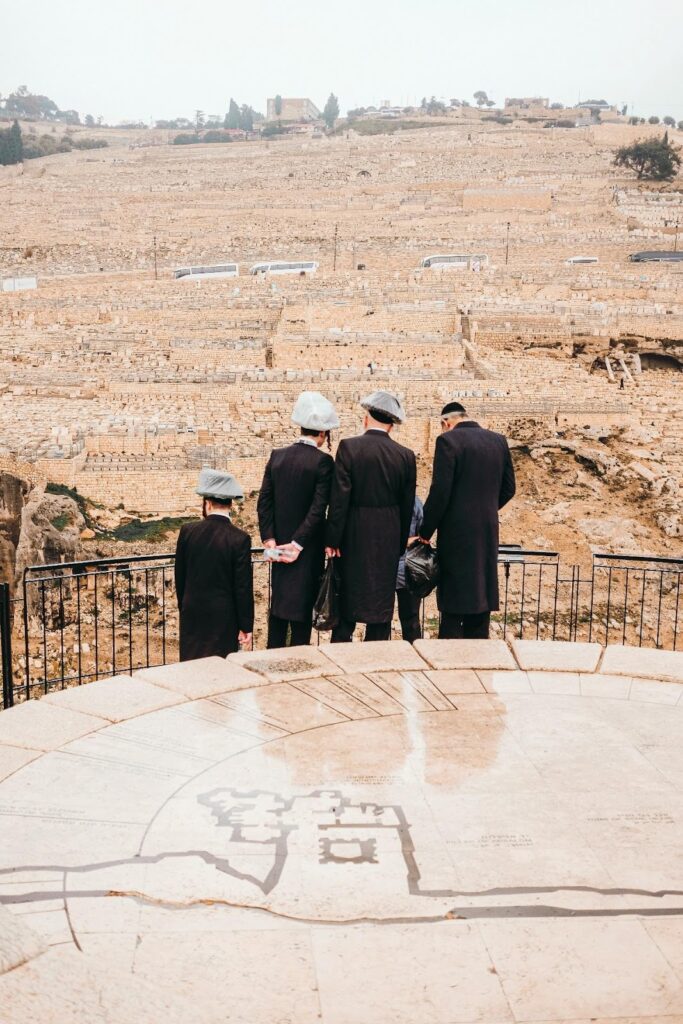Rediscovering Jewish Traditions: The Importance of Cultural Reconnection
This post was last updated on November 20th, 2024

In today’s fast-paced society, rediscovering Jewish traditions holds a special significance. From celebrating age-old rituals to embracing long-lost practices, connecting with your Jewish heritage can offer a profound sense of belonging, enriching our present and future.
Exploring the importance of cultural reconnection reveals how reviving Jewish traditions can breathe new life into modern Jewish communities and why these age-old customs are more relevant now than ever before.
Historical Significance of Jewish Traditions
Understanding the historical significance of Jewish traditions is key to appreciating their true value today. These traditions have not only shaped Jewish identity over centuries but also served as a lifeline for preserving the culture amidst various challenges and changes.
Jewish traditions date back thousands of years and have survived remarkably through history. Starting from the time of the ancient Israelites, many key practices were rooted in the Tanakh (the Hebrew Bible consisting of the Torah, Prophets, and later Writings), the foundational text of Judaism. Early traditions such as Shabbat (Sabbath), Passover, and Hanukkah emerged as central themes in Jewish life.
Over centuries, these traditions continued to grow and adapt. For instance, the Passover Seder, initially a meal centered around the eating of the Passover sacrifice in Jerusalem, evolved into a ritual-rich, highly structured event. Similarly, Hanukkah, once a minor holiday celebrating the rededication of the Second Temple, became more prominent, especially in modern times, with rituals like lighting the menorah and playing dreidel.
The traditions of Judaism have been the bedrock of Jewish identity for millennia. These customs, whether daily prayers or annual festivals, help foster a unique sense of belonging and community among Jewish people.
From a young age, Jewish children are introduced to these practices, shaping their understanding of what it means to be Jewish. Bar and Bat Mitzvahs, for instance, mark the transition into religious adulthood, embedding a sense of responsibility and connection to Jewish heritage.
“These traditions have served as a unifying force for Jews scattered across the globe,” says Michael Freund, founder of Shavei Israel. “Despite geographical and cultural differences, common rituals have provided a shared identity, sustaining community bonds.”
Modern Challenges and Opportunities
In our journey to revive Jewish traditions and practices, we must navigate through a landscape shaped by both challenges and opportunities. Modernity, with its rapid changes and technological advancements, presents unique obstacles but also offers new ways to reconnect with our cultural roots.
Modern life brings many hurdles to the revival of Jewish traditions. One significant challenge is globalization, which can dilute cultural identities. As people travel and settle in different parts of the world, they often adopt the dominant cultures around them. This process, known as assimilation, can erode traditional practices as newer generations may lose touch with their heritage.
Another key issue is the busy lifestyle that many people lead today. With demanding jobs, academic pressures, and social commitments, finding the time for traditional practices can be difficult. Moreover, the secular nature of modern societies often means that there is less communal support for religious observance.
The proliferation of digital media often competes for our attention, drawing us away from deep, reflective practices that are central to many Jewish traditions. The constant barrage of information and entertainment can make it challenging to focus on spiritual and cultural reconnection.
Intermarriage can pose challenges to maintaining Jewish traditions. When people marry outside of their faith, there can be less emphasis on passing down Jewish customs, leading to a gradual fading of these practices within families.
Opportunities for Cultural Revival
“Despite these challenges, modernity also provides numerous chances for reviving Jewish traditions,” says Freund, adding, “One of the most powerful tools at our disposal is technology. The internet and social media platforms offer vast resources for learning about Jewish customs, connecting with global Jewish communities, and participating in virtual religious services,” he says.
Community initiatives play a crucial role in cultural revival. Organizations worldwide are dedicated to preserving and promoting Jewish heritage. These groups often host events, workshops, and cultural festivals that bring people together. Through these gatherings, individuals can experience the richness of Jewish traditions firsthand and build a supportive network.
Education is another significant opportunity. Schools, both secular and religious, can integrate Jewish history and practices into their curricula. By teaching young people about their roots, we ensure that traditions are not lost but instead celebrated and carried forward. Adult education programs can also reengage those who may have drifted away from their cultural practices.
The rise of interfaith dialogues and multicultural exchanges can foster a deeper understanding and respect for Jewish traditions. Engaging in conversations with people of other faiths can highlight the value of preserving one’s cultural heritage while also promoting inclusivity and mutual respect.

Role of Community and Family
Reviving Jewish traditions and practices starts at the heart of our daily lives— in our communities and within our families. These two pillars work hand in hand to nurture a sense of identity and belonging. By engaging in community and upholding family rituals, we ensure that Jewish heritage remains vibrant and strong.
Jewish communities foster a sense of togetherness that is vital for preserving traditions and creating new memories. Synagogues, community centers, and Jewish organizations provide a space where people can gather, celebrate, and learn.
Community events are essential. They bring everyone together, from the youngest to the eldest. Events like Shabbat dinners, holiday celebrations, and educational workshops serve as reminders of shared values and history.
Synagogues play a crucial role too. They are not merely places of worship but also hubs of learning and social interaction. Many synagogues offer classes on Jewish history, Hebrew, and religious practices, catering to all age groups.
Jewish organizations also contribute significantly. Groups like the Jewish Community Centers (JCC) provide various programs that range from cultural festivals to youth activities.
Family Rituals and Practices
Family is the cornerstone of cultural preservation. It’s within the family unit that traditions are most consistently practiced and passed down. Family rituals and practices create a sense of continuity and connection, linking past generations with the present and future.
Rituals such as lighting Shabbat candles, saying blessings before meals, or reciting bedtime prayers are fundamental. These small yet significant actions help instill Jewish values and create a rhythm of daily connection to one’s faith.
Holiday traditions play a key role as well. Passover Seders, Hanukkah candle lighting, and Yom Kippur fasting are central to Jewish life. Celebrating these holidays together strengthens family bonds and reinforces the importance of these traditions. These are moments where stories are shared, songs are sung, and the richness of Jewish culture is vividly experienced.
Intergenerational practices are particularly powerful. Grandparents sharing stories of their own experiences, parents teaching their children how to prepare traditional foods, and kids getting involved in rituals all help to keep the culture alive. These interactions are more than just educational; they are deeply emotional, creating lasting memories and a strong sense of identity.
The lasting importance of cultural reconnection and the revival of Jewish traditions cannot be overstated. As we navigate the complexities of modern life, these practices offer a solid foundation for identity and community. Looking ahead, there is immense potential for growth and preservation. By embracing both innovative approaches and timeless rituals, modern Jewish communities can ensure that their heritage remains vibrant and meaningful.
Recommended For You
5 Pro Tips For Growing Cannabis In Your Own Backyard
Most Inside
Most Inside offers high-quality recommendations and valuable updates to enhance all aspects of your life, providing premium guidance and enriching experiences.




